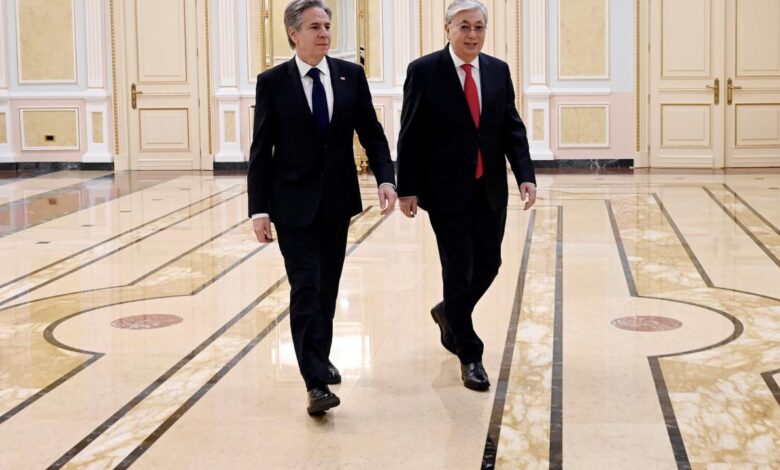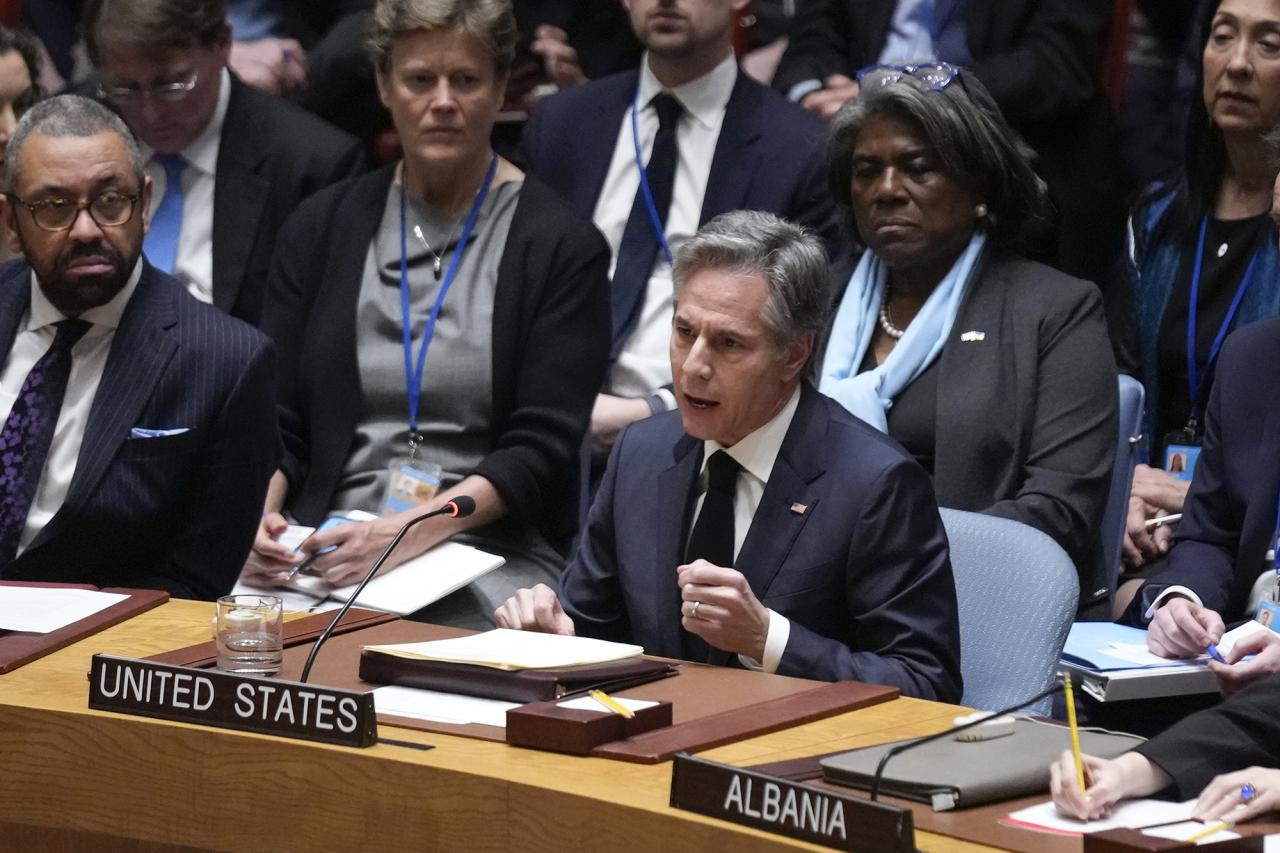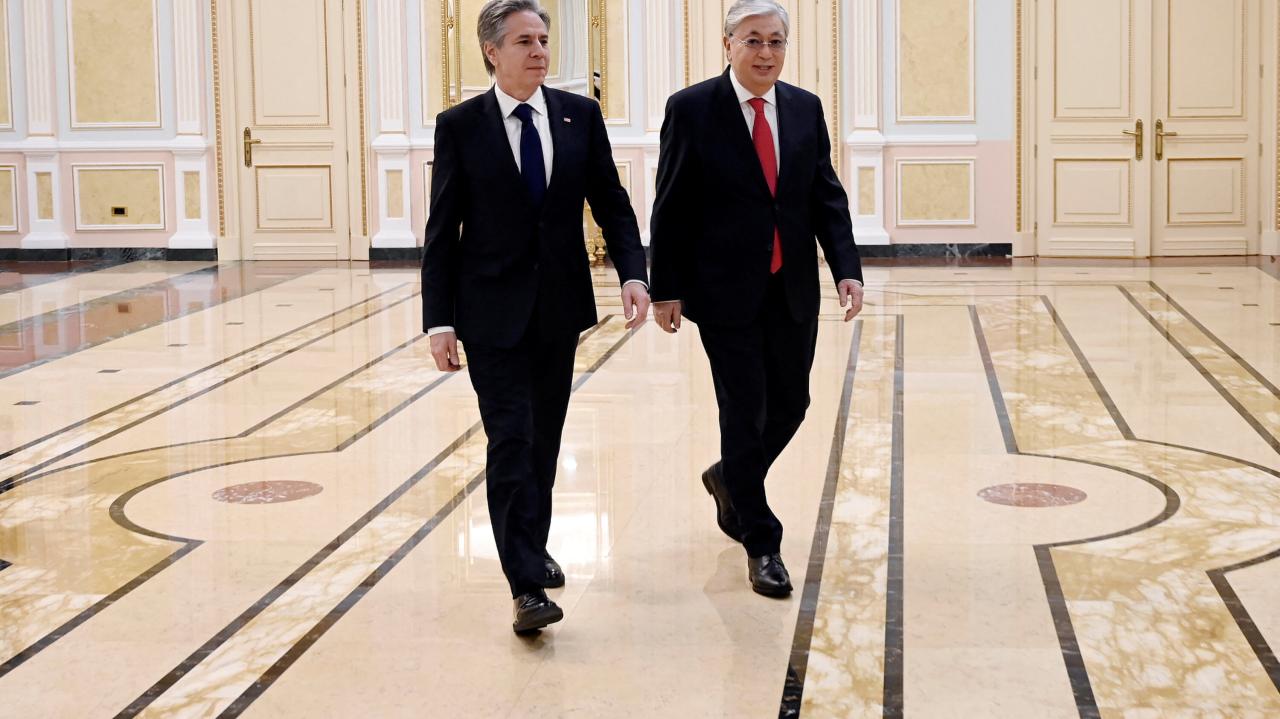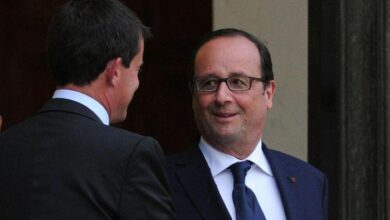
Blinken Resists Push to Label Russia a Terrorist State
Blinken Resists Push to Label Russia a Terrorist State – Amidst the ongoing conflict in Ukraine, a heated debate has emerged regarding whether Russia should be formally designated as a terrorist state. While some argue for such a label, citing Russia’s actions as acts of terrorism, US Secretary of State Antony Blinken has resisted this push, emphasizing the potential diplomatic and legal ramifications.
Blinken’s stance stems from a careful consideration of the complex international landscape and the potential consequences of such a designation. He argues that labeling Russia a terrorist state could further escalate tensions, hinder diplomatic efforts to resolve the conflict, and potentially undermine international cooperation.
Blinken’s Stance
Secretary of State Antony Blinken has resisted calls to designate Russia as a state sponsor of terrorism, a move that would carry significant symbolic and practical implications. While acknowledging the atrocities committed by Russia in Ukraine, Blinken has argued that such a designation would be counterproductive and potentially detrimental to ongoing efforts to hold Russia accountable for its actions.
Reasons for Resistance
Blinken’s stance stems from a careful consideration of the potential consequences of such a designation. He has expressed concerns that it could complicate efforts to secure the release of American citizens detained in Russia, hinder diplomatic channels for de-escalation, and potentially undermine international cooperation on issues of mutual concern.
Additionally, Blinken has highlighted the potential for unintended consequences, such as escalating tensions and jeopardizing ongoing humanitarian aid efforts.
Potential Implications
Designating Russia as a state sponsor of terrorism would have significant implications. It would signal a strong condemnation of Russia’s actions and potentially trigger a range of sanctions, including financial restrictions, travel bans, and arms export controls. However, such a designation could also have unintended consequences, such as exacerbating tensions and undermining diplomatic efforts to resolve the conflict.
Arguments Against Designation
Blinken has presented several arguments against the designation of Russia as a state sponsor of terrorism. He has emphasized the importance of maintaining diplomatic channels for dialogue and de-escalation, arguing that a designation could further escalate tensions and make it more difficult to achieve a peaceful resolution.
He has also highlighted the potential for unintended consequences, such as hindering humanitarian aid efforts and jeopardizing the release of American citizens detained in Russia.
The debate over whether to label Russia a terrorist state is a complex one, with Blinken’s resistance highlighting the potential consequences of such a designation. While the label might seem like a simple solution, it’s important to remember that happiness isn’t always found in the pursuit of power or political maneuvering.
As science says the more of this you give the happier you’ll be hint its not money , perhaps focusing on fostering genuine human connection and compassion could ultimately be a more effective path towards peace and understanding, even in the face of international conflict.
Diplomatic Consequences
Designating Russia as a state sponsor of terrorism would likely have significant diplomatic consequences. It would signal a major escalation in the conflict and could further damage relations between the United States and Russia. It could also complicate efforts to secure international cooperation on issues of mutual concern, such as nuclear non-proliferation and climate change.
Arguments for Designation
The push to label Russia a state sponsor of terrorism stems from a growing international consensus that Russia’s actions in Ukraine, and beyond, warrant such a designation. Proponents argue that this move is necessary to hold Russia accountable for its aggression and to deter future acts of violence.
Rationale for Designation
The rationale for designating Russia a state sponsor of terrorism rests on the belief that Russia’s actions meet the criteria for such a designation. This designation, often applied to states that support or engage in terrorism, would have significant implications for Russia’s international standing and could potentially lead to further sanctions.
Examples of Russia’s Actions
Several actions by Russia have been cited as evidence of its involvement in terrorism. These include:
- The invasion of Ukraine: This invasion, widely condemned as illegal and unprovoked, has resulted in the deaths of thousands of civilians and the displacement of millions. Proponents argue that this act of aggression constitutes state-sponsored terrorism.
- The bombing of civilian targets in Ukraine: Russia has been accused of targeting civilian infrastructure and residential areas in Ukraine, resulting in significant civilian casualties. This deliberate targeting of non-military objectives is considered a hallmark of terrorism.
- The use of chemical weapons in Syria: Russia has been accused of supporting the use of chemical weapons in Syria, which has resulted in the deaths of civilians. This alleged involvement in the use of chemical weapons is seen as a violation of international law and a clear act of terrorism.
Blinken’s resistance to labeling Russia a terrorist state is a complex issue, raising questions about the effectiveness of such a designation and its potential consequences. It also highlights the delicate balance between international diplomacy and the need to hold perpetrators accountable.
This situation begs the question: is free speech, essential for democracy, also its potential downfall? This article explores the complexities of this issue. Ultimately, the decision to label Russia a terrorist state will likely hinge on a careful consideration of the potential benefits and drawbacks, weighing the need for accountability against the potential for further escalation.
Potential Benefits of Designation, Blinken resists push to label russia a terrorist state
Proponents of designating Russia a state sponsor of terrorism argue that this move would have several benefits:
- Increased international pressure: The designation would increase international pressure on Russia to end its aggression in Ukraine and to comply with international law.
- Enhanced sanctions: The designation would allow for the imposition of additional sanctions against Russia, further isolating it from the global economy and undermining its ability to wage war.
- Deterrence of future aggression: The designation would serve as a deterrent against future acts of aggression by Russia, sending a clear message that such actions will not be tolerated by the international community.
International Law and Implications

The designation of a state as a sponsor of terrorism is a serious matter with significant legal and political implications. It is not a decision to be taken lightly, as it can have far-reaching consequences for international relations, diplomacy, and cooperation.
Legal Framework
The legal framework surrounding the designation of terrorist states is primarily based on international conventions and resolutions. The most relevant legal instrument is the UN Security Council Resolution 1373 (2001), which requires all member states to take steps to prevent and suppress the financing of terrorism.
This resolution, along with other UN resolutions and conventions, forms the basis for the legal framework governing the designation of states as sponsors of terrorism.
Impact on International Relations
The designation of Russia as a terrorist state would have a profound impact on international relations. It would likely lead to a significant deterioration of relations between Russia and the West, further isolating Russia on the global stage. This could lead to a number of consequences, including:
- Increased tensions and potential for conflict: The designation could escalate tensions between Russia and the West, increasing the risk of conflict, particularly in regions where Russia and NATO have competing interests.
- Economic sanctions and diplomatic isolation: The designation could trigger additional economic sanctions and diplomatic isolation of Russia, further hindering its economic growth and international influence.
- Limited cooperation on global issues: The designation could significantly hamper cooperation between Russia and the West on critical global issues such as climate change, nuclear non-proliferation, and pandemic response.
Legal Implications for Russia and its Allies
The designation of Russia as a terrorist state would have several legal implications for Russia and its allies. These include:
- Increased scrutiny and sanctions: The designation would subject Russia to increased scrutiny and sanctions, potentially affecting its financial institutions, businesses, and individuals.
- Criminalization of Russian activities: The designation could lead to the criminalization of certain activities by Russia and its allies, including those related to financing, supporting, or providing safe haven to terrorist groups.
- Legal challenges and disputes: The designation could lead to legal challenges and disputes, as Russia and its allies may contest the legality and validity of the designation.
Ramifications for International Cooperation and Diplomacy
The designation of Russia as a terrorist state would have significant ramifications for international cooperation and diplomacy. It would likely:
- Hinder diplomatic efforts: The designation would make it more difficult to engage in diplomatic efforts with Russia, further complicating efforts to resolve international conflicts and crises.
- Undermine trust and cooperation: The designation would erode trust and cooperation between Russia and the West, making it more challenging to address common challenges and build consensus on global issues.
- Create a precedent for future designations: The designation could create a precedent for future designations of states as sponsors of terrorism, potentially leading to a proliferation of such designations and further exacerbating tensions in the international system.
Historical Context: Blinken Resists Push To Label Russia A Terrorist State

The decision of whether to label Russia a state sponsor of terrorism is not a novel one. Throughout history, various countries have been subjected to such designations, each with its own set of circumstances and outcomes. Examining these past instances provides valuable insight into the potential ramifications of such a move against Russia.
The debate over labeling Russia a terrorist state continues, with Blinken resisting the push. It’s a complex issue, and while I’m pondering the implications, I’m dreaming of escaping to a peaceful paradise like the Ritz-Carlton Lake Tahoe , where the crisp mountain air and stunning views offer a much-needed respite.
Perhaps amidst the serene beauty of Tahoe, clarity on the Russia situation will emerge.
Past Designations and Their Outcomes
The United States, in particular, has a history of labeling countries as state sponsors of terrorism. The designation was first introduced in 1979, and since then, several countries have been added and removed from the list.
- Libya:In 1979, Libya was the first country to be designated as a state sponsor of terrorism. This decision was made in response to Libya’s alleged involvement in the bombing of Pan Am Flight 103 over Lockerbie, Scotland. The designation led to a series of sanctions against Libya, including travel restrictions, arms embargoes, and economic penalties.
The designation was lifted in 2004 after Libya renounced terrorism and agreed to pay compensation to the victims’ families.
- Iran:Iran was added to the list in 1984, primarily due to its support for terrorist groups like Hezbollah. The designation has been a source of tension between Iran and the US, with Iran consistently denying any involvement in terrorism.
The designation has had a significant impact on Iran’s international relations and its ability to access global markets.
- Syria:Syria was designated as a state sponsor of terrorism in 1979, but the designation was lifted in 1983. However, in 2012, Syria was re-designated due to its alleged support for terrorist groups like al-Qaeda. The designation has significantly isolated Syria on the international stage and exacerbated the ongoing civil war in the country.
These examples highlight the multifaceted nature of state sponsor of terrorism designations. While such designations can be a powerful tool for holding countries accountable for their actions, they also carry significant consequences for international relations and can contribute to diplomatic tensions and economic hardship.
Domestic Political Landscape
Blinken’s decision to resist the push to label Russia a terrorist state is deeply intertwined with the complex domestic political landscape of the United States. The issue has become highly politicized, with different factions holding contrasting views on the potential consequences of such a designation.
Political Ramifications within the US
The potential political ramifications of labeling Russia a terrorist state within the US are significant and far-reaching. Such a designation would have a profound impact on US foreign policy, public opinion, and the domestic political climate.
- Foreign Policy:Labeling Russia a terrorist state could significantly escalate tensions between the two countries, potentially leading to further diplomatic isolation and sanctions. It could also complicate efforts to address global issues where cooperation is needed, such as nuclear non-proliferation or climate change.
- Public Opinion:The designation could inflame public sentiment against Russia, potentially leading to increased support for a more aggressive stance against the country. However, it could also alienate certain segments of the population who may view the designation as excessive or counterproductive.
- Domestic Politics:The issue has become a partisan flashpoint, with Republicans generally more supportive of the designation and Democrats more cautious. This division could further exacerbate existing political polarization in the US.
Wrap-Up
The debate over labeling Russia a terrorist state highlights the intricate complexities of international relations and the delicate balance between political pressure and diplomatic strategy. While the arguments for and against the designation are compelling, the potential consequences for both Russia and the international community remain a significant concern.
Ultimately, the decision of whether or not to label Russia a terrorist state will be a weighty one, with far-reaching implications for the future of the conflict and global security.






